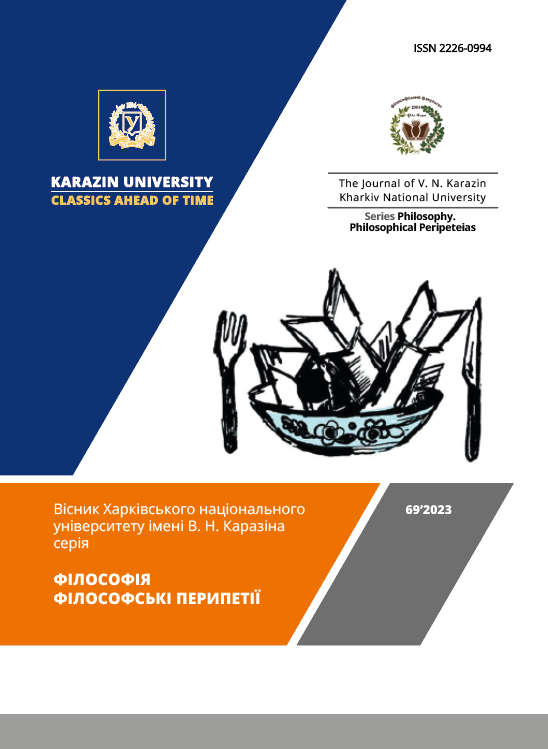BETWEEN THE SPACE OF THE IMAGINARY AND THE SPHERE OF IDEAS: ONTOLOGICAL MODEL OF PROCLUS AND IRANIAN NEOPLATONIC TRADITION OF SUHRAWARDĪ
Abstract
The article is devoted to the study of the influence of Neoplatonic concepts, in particular, the philosophy of Proclus on the discursive space of Iranian Neoplatonism. Proclus' system, Neoplatonic dialectic, turned out to be meaningful for the school of Yahya as-Suhrawardī. Exploring the “Primordial philosophy,” Suhrawardy attempted to build an ontological concept based on the Neoplatonic system. In this case, Proclus's dialectic helped him to reconcile Islamic orthodoxy and Shia concepts of ghulat. The reception of Platonism within the framework of the Illuminativist school had a tremendous influence on the development of Iranian philosophical thought in subsequent periods. It set the discursive framework for Iranian philosophical schools during the Safavid Renaissance of the 16th-17th centuries; Neoplatonism turned out to be the main language of philosophical reflection in the Iranian (more broadly, Shiite) intellectual sphere throughout the High Middle Ages and the New Age. In addition, the influence of Suhrawardi and his followers is also evident in the intellectual tradition of the Ottoman Empire, but the Illuminati traditions of the Sublime Porte require further detailed study. Thus, the strict hierarchy of the ontological and epistemological system confirmed the complex religious and historical constructions of Shiite imamology. The chains of revelation of the vilayat were considered in the context of Neoplatonic emanation, and one of the forms of legitimation of the prophetic revelation of the imams was an appeal to the accidental light, the border space between the world of ideas and the world of matter. In addition, it was the complex, multi-level system of Proclus and Damascus that offered not only a vertical orientation from the Highest Principle to the lower forms of matter, but also numerous horizontal levels parallel to each other, in which each of the hypostases of the One is divided into a number of self-completed participatory hypostases emanating from their uninvolved monadic cause. Maintaining this structure, Suhrawardī speaks of a multiplicity of self-completed revelations emanating from the single source of all prophecies, the reality of alam al-mihtal.
Downloads
References
Bladel, Kevin Thomas van. (2009). The Arabic Hermes: from pagan sage to prophet of science (Oxford studies in late antiquity). Oxford publishing.
Corbin, Henry. (1991). En Islam iranien II Aspects spirituels et philosophiques Suhrawardī et les platoniciens de Perse. Paris: Gallimard (coll. «Bibliothèque des idées»).
Corbin, Henry. (1933). Pour l’anthropologie philosophique: un traité persan inédit de Suhrawardî d’Alep. Recherches philosophiques, 2, pp. 371-423.
Corbin, Henry. (1993а). L’idée de lumière dans la doctrine spirituelle de Sohrawardî; (2) Hamîdoddîn Kermanî (suite). Réédité dans Itinéraire d’un enseignement, Téhéran: Institut Français de Recherche en Iran, pp. 40-46.
Corbin, Henry. (1993b). La cosmogonie de Sohrawardî et son commentaire par Mollâ Sadrâ; (2) Les phénomènes de lumière dans le soufisme de Najmoddîn Kobrâ. Réédité dans Itinéraire d’un enseignement. Téhéran: Institut Français de Recherche en Iran, pp. 51-54.
Deniz Çalış-Kural, B. (2014). Şehrengiz, Urban Rituals and Deviant Sufi Mysticism in Ottoman Istanbul. Routledge.
Green, Tamara M. (1992). The city of the Moon god: religious traditions of Harran. Leiden, New York, Köln: Brill.
Majercik, Ruth (ed., tr.). (1989). The Chaldean Oracles. Text, Translation, and Commentary. (Studies in Greek and Roman Religion, 5). Leiden, New York, Copenhagen and Cologne: Brill.
Mavroudi, M. (2013). Plethon as a Subversive and His Reception in the Islamic World. Power and Subversion in Byzantium. Papers from the 43rd Spring Symposium of Byzantine Studies. Birmingham: Routledge, pp. 177–204.
Mesyats, Svetlana. (2019). What Kind of Souls Did Proclus Discover? Platonism and its Legacy / Ed. by J. Finamore and T. Nejeschleba. The Prometheus Trust, pp. 101-120.
Suhrawardī Shihâboddîn Yahyâ. (1993). I‘tiqād al-Ḥukamā’, in Majmū‘ah-yi Muṣannafāt-i Shaykh-i Ishrāq. Tehran: Mu’assasah-yi Muṭāli‘āt va Taḥqīqāt-i Farhangī, 1372.
Suhravardi Shihâboddîn Yahyâ. (1999). The philosophy of illumination: a new critical edition of the text of Hikmat al-Ishraq / translation, notes, commentary, and introduction by John Walbridge & Hossein Ziai. Provo: Brigham Young University Press.
Suhravardi Shihâboddîn Yahyâ. (1976). L’Archange empourpré, quinze traités mystiques traduits du persan et de l’arabe annotés et présentés par H. Corbin. Paris: Fayard (coll. «Documents spirituels», 14).
Suhrawardi Shihâboddîn Yahyâ. (2005). Philosophers’ Conviction / edit. by F. Radmehr. Tehran: Publication of Ershad Administration.
Rasā'il Ikhwān al-Ṣafā'. (1928). / edited by Khayr al-din al-Zarkali with introductions by Tāha Ḥusayn and Aḥmad Zakī Pasha, in 4 volumes. Cairo, v. 2.
Proclus. (1992). The Elements of Theology: A Revised Text with Translation, Introduction, and Commentary / trans. E.R. Dodds. London: Clarendon Press.
Quṭb al-Dīn al-Shīrāzī. (1895). Sharḥ Ḥikmat al-Ishrāq [with Mullā Ṣadrā’s glosses] / Edited by Asad Allāh Harawī Yazdī. Tehran: facsimile 1315/1895–7.
Tardieu, M. (1987). Pléthon lecteur des oracles. Mètis, 2, 1, 141-164.
Walbridge, J. (1992). The Science of Mystic Lights: Qutb al-Din Shirazi and the Illuminationist Tradition of Islamic Philosophy. Cambridge: Harvard University Press.
Copyright (c) 2023 Микита Артеменко

This work is licensed under a Creative Commons Attribution 4.0 International License.
Authors who publish with this journal agree to the following terms:
- Authors retain copyright and grant the journal right of first publication of this work under the terms of a license Creative Commons Attribution License 4.0 International (CC BY 4.0).
- Authors are able to enter into separate, additional contractual arrangements for the non-exclusive distribution of the journal's published version of the work (e.g., post it to an institutional repository or publish it in a book), with an acknowledgement of its initial publication in this journal.
- Authors are permitted and encouraged to post their work online (e.g., in institutional repositories or on their website) prior to and during the submission process, as it can lead to productive exchanges, as well as earlier and greater citation of published work.






3.gif)




